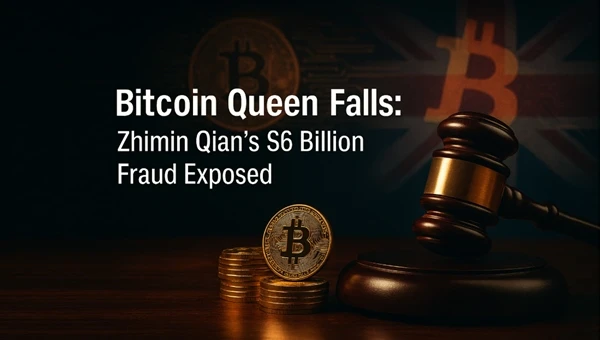

The $6 Billion Ponzi Scheme and Global Chase
Between 2014 and 2017, Qian ran a company called Blue Sky Technology in Tianjin, promising investors double-digit monthly returns through “AI-enhanced” trading strategies. The reality, investigators say, was a Ponzi-style operation that drained life savings from more than 128,000 Chinese citizens.
As Chinese authorities closed in, Qian fled using forged documents and resurfaced in the UK, where she lived in upscale London apartments and attempted to convert Bitcoin into real-estate purchases and jewellery.
By the time the Metropolitan Police raided her home in 2018, the digital trail led to hard drives and wallets holding a fortune. Police analysis of seized laptops revealed an intricate laundering system, blending peer-to-peer transfers, shell companies, and mixers. Detectives at the Metropolitan Police Economic Crime Command described it as “one of the most sophisticated laundering webs ever mapped.”

Following a six-year pursuit through multiple aliases and jurisdictions, Qian was finally apprehended in 2024. Her guilty plea in 2025, covering acquisition and possession of criminal property, confirmed suspicions that the funds originated from a massive Chinese investment fraud.
The Southwark Crown Court now prepares for sentencing, a moment seen as symbolic for global crypto enforcement.
Victims Seek Justice and Restitution from Seized Fortune
Beyond the numbers, the story’s human toll runs deep. More than 1,300 victims have joined civil recovery efforts at London’s High Court, seeking restitution from seized assets, including £11 million in cash, gold, and altcoins.
For many families in China, the losses represented college savings, dowries, or retirement funds. Victims say they were lured by “guaranteed” 10–15 percent returns that vanished overnight when Qian disappeared.
“People sold homes to invest,” one claimant told Chinese media, “and now they wait for justice in a country they’ve never seen.”
The UK Crown Prosecution Service is crafting a compensation framework, but fluctuating Bitcoin prices could alter payout values by millions daily. Legal experts note that coordination with Chinese courts may take years, echoing other drawn-out restitution efforts like BitConnect’s 2021 collapse, where most investors recovered less than 5 percent of their losses.
Case Fuels Global Debate on Crypto Regulation and AML
The Qian case has reignited global debate over how nations regulate crypto finance. Her scheme, and others like it, fuel skepticism around crypto lending and DeFi platforms, a sector repeatedly tested by high-profile breaches.
According to Chainalysis, crypto-related thefts fell sharply from a record $3.7 billion in 2022 to $1.9 billion in 2023, before climbing again above $2.3 billion in 2024 as hackers shifted from exchange exploits to bridge and wallet intrusions. In 2025, cumulative global losses have already topped $2.8 billion.
In response, the UK Financial Conduct Authority tightened Know-Your-Customer and anti-money-laundering (AML) rules for digital asset firms, requiring detailed risk disclosures and verification protocols.
A Verdict That Could Reshape Crypto Accountability
As judges deliberate in Southwark, the Qian verdict is poised to set a precedent. A maximum sentence would echo the message delivered in 2024 when associates of OneCoin’s Ruja Ignatova received decades in prison for a $4 billion fraud. Together, these cases reinforce that digital anonymity no longer shields criminality.
For a market now valued above $2.5 trillion, accountability has become existential. Exchanges including KuCoin and Binance have since introduced stricter AML systems, cutting suspicious transaction volumes by nearly 25 percent year-on-year.
The Qian prosecution also validates the growing role of international collaboration, from Interpol alerts to blockchain forensics linking wallets across jurisdictions.
Bitedge’s Takeaway
Qian’s downfall represents both a legal victory and a moral reckoning for crypto. For regulators, it proves that digital assets can be traced, seized, and repurposed for justice. For investors, it’s a cautionary parable against chasing unsustainable yields.
At Bitedge, we view the case as a catalyst for stronger global standards in digital-asset governance. Enforcement must evolve beyond courtrooms toward prevention, through public education, platform audits, and cross-border coordination.
Crypto’s promise of transparency must finally outpace its predators. Until then, vigilance, not volatility, remains the market’s most valuable asset.
He has worked with several companies in the past including Economy Watch, and Milkroad. Finds writing for BitEdge highly satisfying as he gets an opportunity to share his knowledge with a broad community of gamblers.
Nationality
Kenyan
Lives In
Cape Town
University
Kenyatta University and USIU
Degree
Economics, Finance and Journalism


Facts Checked by Josip Putarek

 Fact checked by
Fact checked by 
 eabungana@gmail.com
eabungana@gmail.com 